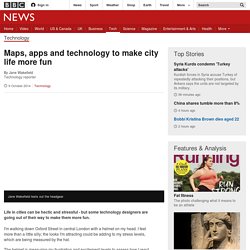

BBC World Service - Click - Downloads. CNET Podcasts. Apple Byte The Apple Byte covers the fact, the fiction, and everything inside the world of Apple.

Brian Tong talks about the latest Apple announcements, the rumors, and he'll break down the good and bad of Apple with an edgy style. Hosted by: Brian Tong CNET RSS | iTunes | FeedBurner | YouTube Apple Byte: Extra Crunchy The Apple Byte: Extra Crunchy audio podcast brings more stories, more details and more talking each week with CNET's Brian Tong and Stephen Beacham. Technology + Audio. HowStuffWorks Podcasts" Radio Archive by Date. Derbyshire boy's 'double broom' among best inventions. A double-headed broom invented by a three-year-old Derbyshire boy has been hailed as one of the most ingenious inventions in recent years.

Sam Houghton, now eight, used a rubber band to strap together two types of brush so debris and fine dust could be swept up simultaneously. He said he was inspired by the animated adventures of Wallace and Gromit. The product forms part of a British Library exhibition showcasing the UK's top 15 inventions of the past decade.
Sam, from Buxton, came up with the idea while watching his father swap between two brushes as he tried to clear up leaves and finer debris. Strapping the two together, he created the "Improved Broom" which can be flipped around for different jobs. At the age of five he was granted an official patent and is thought to be the youngest Briton yet to hold one. He said: "It is for when you are having trouble sweeping up. "I think it is a tremendously inspiring invention," he said. The 'smart' suit that can purify air. Tomorrow's cities - How do cities get smarter?
Mention "smart cities" to people and the first questions they ask are: "What is a smart city?

" and "Where is the smartest one? " Unfortunately neither are particularly easy to answer. Smart means different things to different cities. For some, it may be finding ways to relieve pollution or congestion - using sensors and data analysis. For others, it is more about finding ways to make cities greener - with bike-sharing schemes or more parks. Some cities have been built with smartness in mind, such as Songdo in South Korea, which has hi-tech plumbed into its infrastructure, or green city Masdar in the United Arab Emirates.
Maps, apps and technology to make city life more fun. Life in cities can be hectic and stressful - but some technology designers are going out of their way to make them more fun.

I'm walking down Oxford Street in central London with a helmet on my head. I feel more than a little silly; the looks I'm attracting could be adding to my stress levels, which are being measured by the hat. What if...you could design a city? As part of its project on the cities of the future, the BBC asked a series of experts to explain their vision of where they would like to live in the future.

With input from those who are planning new cities to people who are retro-fitting old ones and even a child's view of the future, we asked one simple question: "What if you could design a city from scratch? " We have had some intriguing answers, from those who think the smart cities of the future will rely on technology to those who want to put people centre stage. And for the children, who will after all be the citizens of these future urban spaces, the vision is more fantastical. But then, who wouldn't want a city with tree-high swimming pools full of sweets? Guru Banavar - IBM Guru Banavar is IBM's chief technology officer and was the chief architect behind Rio de Janeiro's control centre.
Mount Fuji is getting free wifi – but it’s far from the weirdest place to have it - News - Gadgets and Tech - The Independent. The Japanese government is installing a wifi connection up the mountain, so that people can stay connected even as they ascend and then come back down.

Though the wifi connection has been mocked as just a way of letting people post their celebratory Instagram snaps just a little earlier, it could actually keep those climbing the mountain safe. They’ll be able to look out for weather warnings and take shelter accordingly, and the wifi will let people call for help even if they’re out of range of a phone connection. read moreRoads revolution: £11bn project will see roadside wi-fiNew service will allow customers to make calls across Wi-fi networksVirgin America planes to get wifi fast enough to stream Netflix The wifi will be available in a series of spots along the ascent, and protected with a special password. It will only be free for the first 72 hours after people connect. BBC Radio 4 - A History of the World in 100 Objects, The World of Our Making (1914 - 2010 AD), Credit card. Seven things security experts do to keep safe online. Cybersecurity experts aren’t like you or I, and now we have the evidence to prove it.

Researchers at Google interviewed more than 200 experts to find out what security practices they actually carry out online, and then spoke to almost 300 non-experts to find out how they differ. Perhaps unsurprisingly, the security experts practice what they preach – or, at least, they tell Google they do. They’re more likely to use two-factor authentication, to install software updates, and avoid visiting shady websites. Surgeon saves boy's life by text. A British doctor volunteering in DR Congo used text message instructions from a colleague to perform a life-saving amputation on a boy.

Vascular surgeon David Nott helped the 16-year-old while working 24-hour shifts with medical charity Medecins Sans Frontieres (MSF) in Rutshuru. The boy's left arm had been ripped off and was badly infected and gangrenous. Mr Nott, 52, from London, had never performed the operation but followed instructions from a colleague who had. The surgeon, who is based at Charing Cross Hospital in west London, said: "He was dying. He had about two or three days to live when I saw him. " Careful instructions It is not clear how the boy was injured.